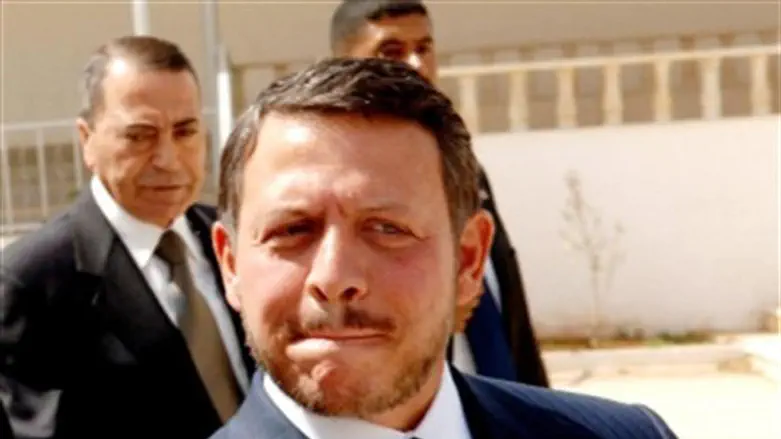
In an interview with the Washington Post, Jordan's King Abdullah II said his nation and Egypt have a "special relationship" with Israel.
King Abdullah also spoke about the Syrian civil war, Russia's role in the Middle East, Iran's influence, and the Israeli-Arab conflict.
In the interview, King Abdullah said of the building in Judea and Samaria, "These issues do create animosity and difficulty — when I know that the priority of the president is to fight extremism and terrorism globally. These issues give ammunition to the Iranians, to [Islamic State leader Abu Bakr] al-Baghdadi and ISIS."
However, he denied being the cause of US President Donald Trump's demand Israel freeze building in the area.
"I think people are giving me way too much credit. They are saying that I had something to do with it. I don’t know if I did. I just expressed my views," he said.
"I have been in contact with Israeli Prime Minister Binyamin Netanyahu," King Abdullah said. "Egypt and Jordan have a special relationship with Israel, and so if we don’t move forward, it puts more pressure on the Jordanians and the Egyptians.
"[The point of] my visit here — and the American administration agrees with me — is that we have got to put this all together. If there are settlements, how does this affect the peace process? I think the major challenge that we have is: Are we for a two-state solution? I don’t see any alternative but the two-state solution.
"There are some strategic problems that Iran is involved in in our area. But here, again, is an opportunity: bringing Israel and the Arabs closer together. Because of the Iranian regime’s potential threat to the region, Israel wants to have a relationship with the Arabs.
"But the problem that is [standing] between the Arabs and the Israelis is the Palestinians. The whole point of our peace initiative is for us to be the guarantors of Israel’s security. If we can solve the Palestinian problem, then this is a new era of stability in our area, where Israelis are truly a part of the neighborhood."
King Abdullah also said Trump "wants to engage and make a deal for Israelis and Palestinians" and added, "I was really struck by the commitment he had in bringing the Israelis and Palestinians together."
Regarding Russia, the king said, "From Putin’s point of view, he has a major challenge with terrorism. ISIS international is heading towards Moscow. I think [the subway attack in] St. Petersburg is the start of foreign fighters moving to another battleground.
"Putin has to find a political solution sooner rather than later in Syria. If European countries have problems with foreign fighters, the Russians have 10 times more problems. They have all the terrorists from the Caucasus and have had two wars in Chechnya.
"A Russian-American dialogue will help. Otherwise, the Americans and Russians will fight it out in Syria and Libya. If you keep this tension going, the next problem will be in Moldova. . . . Russians are going to continue to shake the tree, unless we come to a meeting of minds."
However, about Syria he said, "I think Raqqa will fall. I think things are going well in Syria and Iraq in defeating terrorism. The only problem is [militants] are going to move down towards us [in Jordan], which is a challenge, but we are ready for it in coordination with the U.S. and the British.
"But they are also going elsewhere — you see them shift to Libya, and, as we succeed in Libya, they will move down into the Chad Basin, and that is going to strengthen Boko Haram. If Boko Haram is strengthened, then that is going to affect al-Shabab. Many members of the U.S. administration get that, and I think you are seeing a new strategy. We can’t just focus on Syria and Iraq. We have to focus internationally — wherever these people are, we have to take the fight to them.
"Regarding the chemical attacks we saw in Syria this week, we have the moral obligation as members of the international community to fight this horrendous tragedy that is befalling civilians in Syria."
Even if the chemical attacks were caused by Syrian President Bashar al-Assad, King Abdullah thinks, "We have to have a unified policy on what is acceptable and what is not.
"Getting rid of Assad is a discussion for [future] Geneva [talks]. The Astana talks [backed by Russia, Iran and Turkey] that we’re involved in are purely related to getting a military cease-fire.
"We all know that the Russians want [Assad] there longer than the rest of us do, but I don’t think the Russians are wed to Assad. Common sense dictates that somebody who is the figurehead of such bloodshed towards his people probably will move on."
Russians may barter on how Assad exits, King Abdullah said. "At the end of the day, we need a regime that is accepted by all Syrian people."
However, what the kind worries most about is his own country, his "people and their economic situation."
"There is a lot of unemployment, and that could lead to radicalization. That is what has kept me up for the past five or six years: the economy. Not the politics or the military or security situation. I am trying to grow the economy and look after my people."